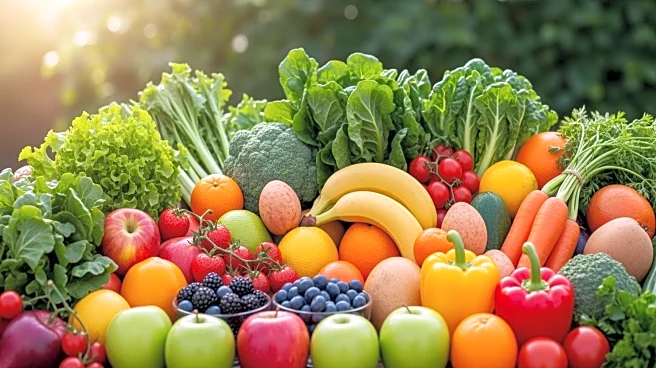What's Happening?
The U.S. Department of State, in collaboration with the African Union and the Food and Agriculture Organization (FAO), has launched the Vision for Adapted Crops and Soil (VACS) initiative. This program
aims to bolster food systems across Africa by identifying crops with high potential in a changing climate. The initiative focuses on leveraging the genetic diversity of under-utilized crops such as cowpea, teff, and okra, which have not been prioritized by agricultural policies. The goal is to optimize crop distributions while preserving Indigenous knowledge, thereby creating more resilient food systems. This effort is part of a broader strategy to adapt global farming systems to climate change, which includes crop shifting and switching to maintain yields and enhance farmer incomes.
Why It's Important?
The VACS initiative is significant as it addresses the pressing issue of climate change impacting agricultural productivity and food security. By focusing on crops that are better suited to changing climates, the initiative aims to ensure sustainable food production and economic stability for African nations. This approach not only supports local farmers but also preserves cultural heritage and traditional farming practices. The initiative could serve as a model for other regions facing similar challenges, highlighting the importance of integrating Indigenous knowledge into modern agricultural strategies. The success of this program could lead to increased resilience against climate variability, benefiting both local communities and global food markets.
What's Next?
The next steps for the VACS initiative involve scaling up the production of climate-adapted crops and integrating them into regional farming systems. This will require developing value chains and seed propagation systems to support these crops. The initiative may also prompt further collaboration between international organizations and local governments to enhance agricultural policies and support smallholder farmers. Monitoring and evaluation will be crucial to assess the impact of these changes on food security and economic development. Stakeholders, including policymakers and agricultural experts, will likely continue to explore innovative solutions to adapt to climate change and ensure sustainable food systems.
Beyond the Headlines
The VACS initiative highlights the ethical and cultural dimensions of climate adaptation in agriculture. By prioritizing Indigenous knowledge and traditional crops, the program acknowledges the importance of cultural heritage in farming practices. This approach not only supports biodiversity but also empowers local communities to maintain their rural identity. The initiative underscores the need for global cooperation in addressing climate change, emphasizing the role of traditional knowledge in building resilience. As climate impacts become more pronounced, similar programs may emerge worldwide, fostering a deeper understanding of the interconnectedness between culture, environment, and agriculture.









